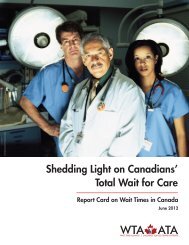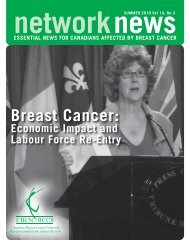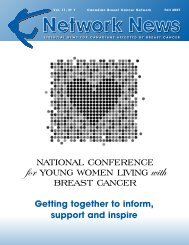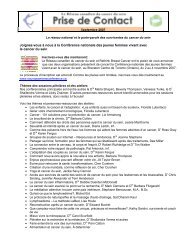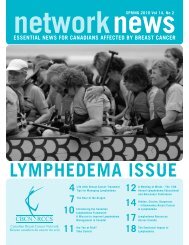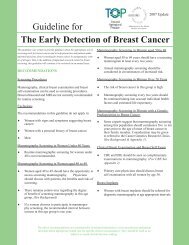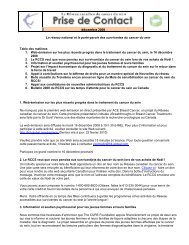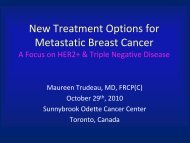Network News - Winter/Spring 2010 - Canadian Breast Cancer ...
Network News - Winter/Spring 2010 - Canadian Breast Cancer ...
Network News - Winter/Spring 2010 - Canadian Breast Cancer ...
Create successful ePaper yourself
Turn your PDF publications into a flip-book with our unique Google optimized e-Paper software.
Familial <strong>Breast</strong> <strong>Cancer</strong> and No BRCA1/2 Mutation?<br />
Uninformative Results and How the Familial <strong>Breast</strong> <strong>Cancer</strong> Research Unit<br />
is Seeking Answers<br />
By Jillian Alston, MD Candidate<br />
In the mid-nineties, the discovery<br />
of the BRCA1 and 2 mutations<br />
answered some of the questions<br />
that many had about the alarming<br />
number of breast and/or ovarian<br />
cancers in their family. Furthermore, a<br />
woman from such a family who has not<br />
been diagnosed with cancer can now<br />
establish her risk of breast cancer by<br />
being tested for her family’s hereditary<br />
gene. Women who receive positive<br />
results struggle with how to manage<br />
their increased risk. Fortunately there<br />
are recommendations for BRCA1/<br />
BRCA2 carriers with ever-growing<br />
research to improve the management<br />
and prevention of cancer in these<br />
families. I am aware that I have<br />
immensely minimized the complex<br />
nature of the genetic testing process<br />
and all of its considerations, including<br />
its influence on psychological wellbeing<br />
and family dynamics. As well, in<br />
no way do I wish to oversimplify the<br />
difficulty of one’s journey of living with<br />
a BRCA1/2 mutation.<br />
Jillian Alston<br />
However, the focus of this article<br />
is on those women who have an<br />
overwhelming number of relatives<br />
diagnosed with breast cancer – but<br />
who do not have a known mutation in<br />
their family. Approximately 15-20% of<br />
women who are diagnosed with breast<br />
cancer have a strong family history of<br />
breast cancer. This number includes the<br />
5% incidence of breast cancer that is<br />
found in women with a mutation in one<br />
of the two known breast cancer genes,<br />
BRCA1 and BRCA2. This indicates that<br />
the majority of women who have had<br />
genetic testing for their familial breast<br />
cancer have no specific genetic reason<br />
for the family history, in that they<br />
receive an “uninformative result.”<br />
Women who have a significant 1 breast<br />
cancer history in their family are two to<br />
four times more likely to develop breast<br />
cancer than females without a significant<br />
family history, even if they do not<br />
have a BRCA1 and BRCA2 mutation. 2<br />
There is currently little information<br />
available to inform these women and<br />
their physicians about screening and<br />
prevention practices. Unlike BRCA1/2<br />
mutation carriers, there is no established<br />
standard for offering earlier screening<br />
(either mammography or MRI), or<br />
for offering chemoprevention or<br />
prophylactic surgeries (e.g. bilateral<br />
mastectomy or bilateral salpingooophorectomy).<br />
Dr. Steven Narod and his research team<br />
at the Familial <strong>Breast</strong> <strong>Cancer</strong> Research<br />
Unit of Women’s College Research<br />
Institute in Toronto, are trying to<br />
improve the care of these families by<br />
initiating the research study Risk Factor<br />
Analysis of Familial <strong>Breast</strong> <strong>Cancer</strong>. This<br />
is an unprecedented long-term study<br />
of women with strong family histories<br />
of breast cancer who do not carry a<br />
mutation in one of the two breast cancer<br />
genes (BRCA1/BRCA2).<br />
The study involves testing for other<br />
positive genetic markers of breast cancer<br />
as well as examining the interaction<br />
between other various factors that<br />
may be associated with breast cancer<br />
development in women from highrisk<br />
families. Some of these include<br />
Vitamin D levels, insulin levels, dietary<br />
factors, demographic characteristics and<br />
others factors. As well, the study will<br />
examine the effectiveness of prevention<br />
strategies that various women use. The<br />
goal is to hopefully develop future<br />
recommendations for the prevention and<br />
management of familial breast cancer.<br />
If you are concerned about the incidence<br />
of breast cancer in your family or if you<br />
are concerned about breast cancer with<br />
the future generation of your family, the<br />
research team invites you to take part<br />
in this study. The team is looking for<br />
women who have a significant family<br />
history of breast cancer and who have<br />
no known BRCA1/2 mutations in their<br />
family.<br />
For more information about the<br />
study, or to see if you are eligible to<br />
participate, please visit:<br />
http://www.womensresearch.<br />
ca/noncarrierstudy/index.php.<br />
Alternatively, you may contact Jill by<br />
email at jillian.alston@wchospital.ca or<br />
call 416-351-3800 ext 2715.<br />
The Familial <strong>Breast</strong> <strong>Cancer</strong><br />
Research Unit<br />
World-renowned research to improve the<br />
lives of families with familial breast cancer<br />
Dr. Steven Narod<br />
The Familial <strong>Breast</strong> <strong>Cancer</strong> Research<br />
Unit is a division of the Women’s<br />
College Research Unit. Under the<br />
direction of Dr. Steven Narod, the<br />
world’s most cited breast cancer<br />
researcher, the unit conducts worldclass<br />
research that contributes to the<br />
prevention and management strategies<br />
for women with familial breast cancer<br />
and their families.<br />
The unit offers a service of genetic<br />
counsellors that support women and<br />
their families through the genetic testing<br />
<strong>Network</strong> <strong>News</strong> <strong>Winter</strong>/<strong>Spring</strong> <strong>2010</strong> 31



